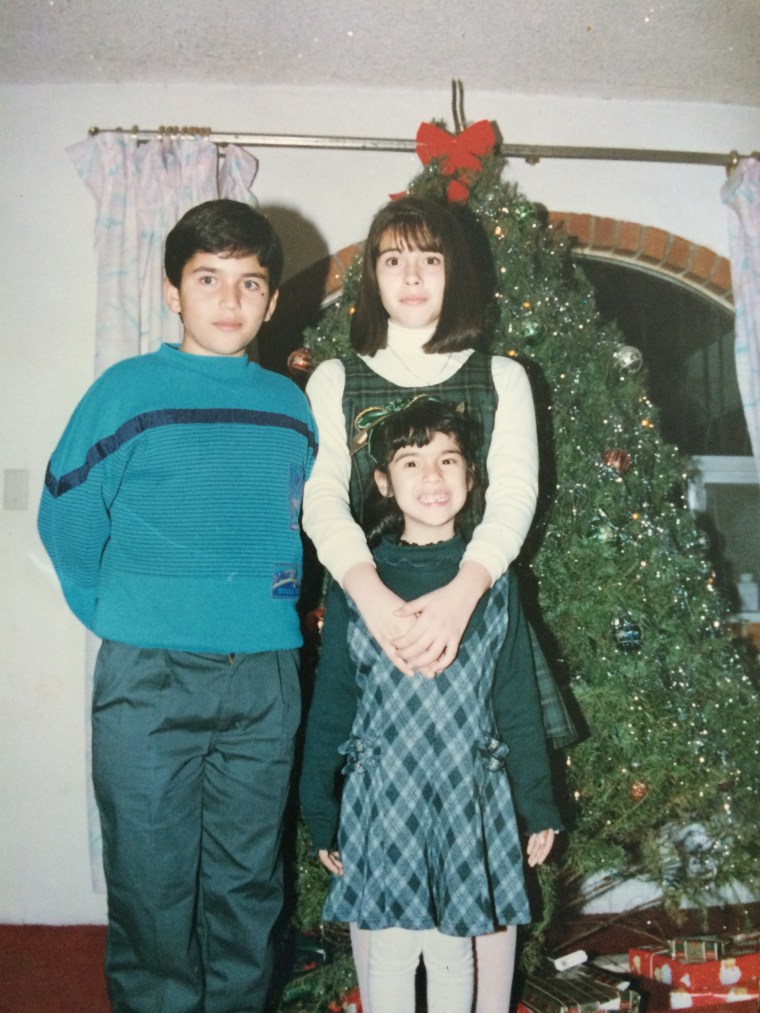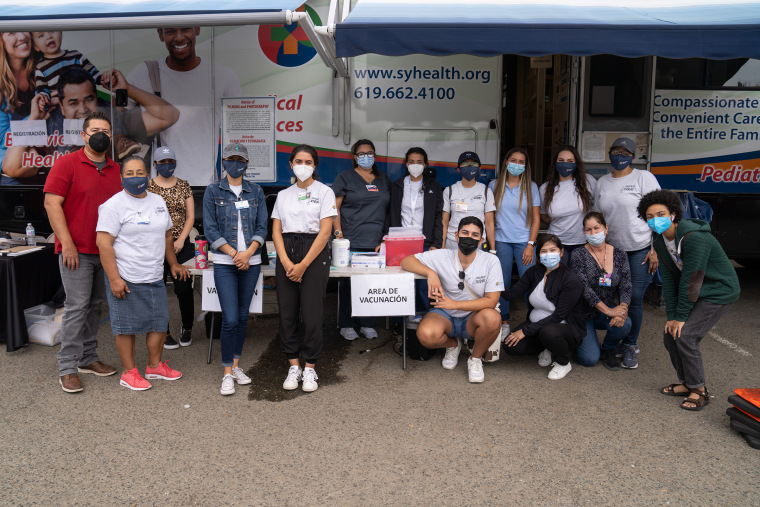During Hispanic Heritage Month, TODAY is sharing the community’s history, pain, joy and pride. We are highlighting Hispanic trailblazers and rising voices. TODAY will be publishing personal essays, stories, videos and specials throughout the month of September and October. For more, head here.
Almost every endeavor Dr. Argentina Servin has taken on in her 14 years since becoming a physician has been directly inspired by her upbringing. She’s the daughter of a single mom who moved to San Diego from Mexico before Servin was born. Servin’s the oldest of three siblings and while she has fond memories of her childhood and regularly visiting family in Mexico, there was always an underlying fear of getting sick — her family didn't have health insurance.
That experience inspired her decision to help launch Project 2VIDA!, an initiative through the University of California San Diego School of Medicine that seeks to boost vaccination rates among local Latinx and Black communities. It’s also a two-phase study focused on health misinformation. Latinx and Black communities have disproportionately suffered due to the COVID-19 pandemic, and while these groups had lagged behind in vaccination rates, racial gaps have narrowed recently, according to research from the Kaiser Family Foundation.
Since the program was launched earlier this month, it’s vaccinated about 350 people and linked people to more than 1,000 health services, from COVID-19 testing to blood pressure and glucose screenings. Countless others have received medically accurate information on the coronavirus in their primary language.
Despite her busy schedule as an assistant professor, researcher and new mom, Servin, 36, finds time to attend the project's pop-up vaccination sites, in partnership with local health system San Ysidro Health, and speak to attendees in Spanish to allay any concerns. She’s hands-on — a trait developed from helping raise her younger siblings while her mom worked multiple jobs.

“I’m Latina, and there's always this super respect of, ‘Oh my God, doctors are so important, so busy,’ and the fact that you take that time to meet with people one-on-one is very appreciated,” Servin told TODAY. “Some folks might not have a regular provider where they go for care because they might not have health insurance or it might be too expensive. ... They have a lot of questions. There's a lot of misinformation.”
One of 2VIDA!’s goals is to find people where they already are, setting up in grocery stores, for example. Servin hopes 2VIDA! will be a model for providing care to underserved communities long after the pandemic.
“We're out in the parking lot with a huge mobile unit, like, ‘Hey, do you want to get your blood pressure checked?’ And people will come up and be like, ‘What’s this about?’ I think that’s what’s really unique, to really bring the care to the communities.”
One success story that stands out? A teenage boy with autism who was the son of a Project 2VIDA! volunteer and had concerns about getting vaccinated. He wanted to observe how the vaccine was administered, so he attended a pop-up, saw the different stations and asked questions. Two weeks later, he got his first shot.

“There's different needs in the community that we're not accounting for,” Servin stressed. “He was perhaps scared or nervous or not understanding the science. But physically seeing people getting the vaccine, how they felt OK after, how we were friendly and there in the community constantly … It’s something I had never thought about.”
An experience with her grandfather in Mexico earlier this year played a role in Servin’s desire to do this work. He contracted COVID-19 in December and isn’t a U.S. citizen, so he couldn’t cross the border to get care.
“Fortunately he survived and he got his vaccine,” she continued. “I spent a lot of weekends with my grandparents so it hit home really close.”
Servin decided to become a doctor after being diagnosed with tuberculosis at age 12, her first real experience with health care. Preventive care, she explained, wasn’t emphasized in her culture. Her mom and siblings also came down with tuberculosis as well, but recovered more quickly.
“Not having access to health care, my mom not knowing how to navigate the system, we all are U.S. citizens, we would have been eligible for different government-sponsored insurance, but she didn’t know,” Servin said. “It was really scary when we got sick because we didn't have access to care.”
She was able to get treatment, but her health issues persisted until she was 15.
“The doctor who took care of me was a really sweet man,” she recalled. “He talked to us in Spanish so my mom could understand what he was saying. … That made me want to be a doctor because I wanted to make people feel good, the way he made me feel good.”
Since then, Servin has continued to serve her community, something she learned from her mother: “Even though we didn’t have a lot, she always instilled in us to share with others.”
She’s taught medical students and residents as she provided care in refugee clinics for migrants, asylum seekers and deportees in San Diego and Tijuana, and also mentors undergrads interested in medical school. Servin went to medical school in Mexico because she didn’t have any resources to help navigate the American system.
“I can better prepare those students that are first generation that don't have any money but they know they want to do this,” Servin said, adding that she often works with them on a checklist for the application process and connects them with opportunities through her own mentors in the medical field.
“Everything that I do has been inspired by the challenges and the adversities that I faced growing up,” she added. “(My upbringing) definitely taught me not to give up. … I feel very fortunate I found a career path that allows me to give back.”
For more of our Hispanic Heritage Month coverage, tune into TODAY All Day’s special, “Come with Us: Celebrating Hispanic Heritage Month,” hosted by Tom Llamas. Watch Wednesday, Sept. 29, at 12:30 p.m., 4:30 p.m. and 8:30 p.m. EST at TODAY.com/allday.
Related:

